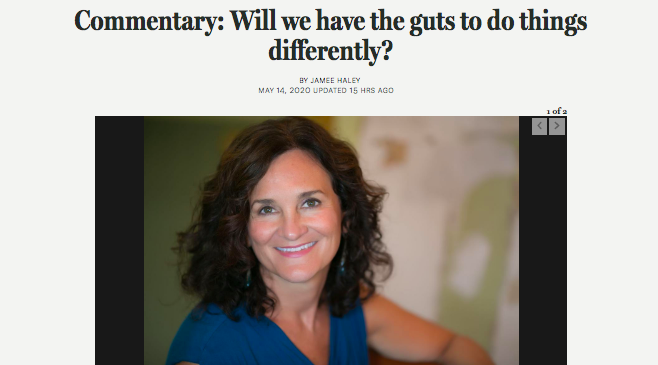
Provided by Jamee Haley, Executive Director. Posted by the Post & Courier, May 14, 2020:
Once the panic subsides, if it does subside, we would be mistaken to not pause long enough to think about the future of our city, region and country through a new lens. Charleston’s real estate boom has been like a “Girls Gone Wild” video of investors clamoring to own a piece of the Holy City. This frenzy has driven up real estate prices to a point where many of the businesses with owners who actually live here in Charleston and were struggling to make ends meet before the pandemic will more than likely not make it post COVID-19.
It’s a dire situation with thousands not just waiting for unemployment checks but waiting to even be able to apply for unemployment, and business owners whose heads are spinning from the confusion around the CARES Act and SBA funding. Pandemics are not for the faint of heart.
But, what have we learned? And will we have the guts to do things differently as we move forward? I predict that we will have an excess of empty real estate in the area. Will property owners be willing to work with tenants to provide affordable commercial space for those brave souls and tenacious entrepreneurs willing to take the leap? Will business owners rethink their growth goals, pay employees a living wage and build a strategy that allows for more than 27 days of operating capital? No one could be prepared for the accelerated recession we are now experiencing. So how do we better prepare our communities, our businesses and our workforce for a more resilient future?
- Work on building requirements and update zoning now. As long as we require a certain number of parking spaces in apartment buildings and expensive building materials, we will never have affordable housing that allows workers to live closer to jobs.
- Pay people a wage that they can live on, and eliminate the working poor mentality.
- Build smaller retail spaces so that merchants carry less inventory and reduce overall costs.
- Allow businesses that create experiences for customers like breweries, distilleries and light manufacturing to exist in the historic district. These are the experiences that both locals and visitors desire.
- Create more equitable opportunities for people of color. This goes back to the first and second recommendations, but let’s also make sure that minority businesses are not pressured out of the area and instead make room for more minority businesses so that Charleston isn’t just a museum for the labor forced upon the enslaved to build a city for tourists to enjoy.
- Rethink economic development to encourage a regenerative rather than extractive economy. If big corporations want to locate here, support them, but let them do so on their own dime. If they are truly successful, there is no reason why they should be given subsidies when those businesses whose profits stay in our communities are not provided the same level of support.
This list is by no means exhaustive. It doesn’t touch on building equity in health care, education or transportation but clearly nothing exists in a silo. My favorite quote by Buckminster Fuller is, “You never change things by fighting against the existing reality. To change something, build a new model that makes the old model obsolete.” I hope we can all put aside our individual agendas to create a new model with an equity lens for the Charleston region.
Jamee Haley is executive director of Lowcountry Local First, a Charleston-based nonprofit leader and a North Charleston resident.
Post & Courier Commentary: Will we have the guts to do things differently?
Provided by Jamee Haley, Executive Director. Posted by the Post & Courier, May 14, 2020:
Once the panic subsides, if it does subside, we would be mistaken to not pause long enough to think about the future of our city, region and country through a new lens. Charleston’s real estate boom has been like a “Girls Gone Wild” video of investors clamoring to own a piece of the Holy City. This frenzy has driven up real estate prices to a point where many of the businesses with owners who actually live here in Charleston and were struggling to make ends meet before the pandemic will more than likely not make it post COVID-19.
It’s a dire situation with thousands not just waiting for unemployment checks but waiting to even be able to apply for unemployment, and business owners whose heads are spinning from the confusion around the CARES Act and SBA funding. Pandemics are not for the faint of heart.
But, what have we learned? And will we have the guts to do things differently as we move forward? I predict that we will have an excess of empty real estate in the area. Will property owners be willing to work with tenants to provide affordable commercial space for those brave souls and tenacious entrepreneurs willing to take the leap? Will business owners rethink their growth goals, pay employees a living wage and build a strategy that allows for more than 27 days of operating capital? No one could be prepared for the accelerated recession we are now experiencing. So how do we better prepare our communities, our businesses and our workforce for a more resilient future?
This list is by no means exhaustive. It doesn’t touch on building equity in health care, education or transportation but clearly nothing exists in a silo. My favorite quote by Buckminster Fuller is, “You never change things by fighting against the existing reality. To change something, build a new model that makes the old model obsolete.” I hope we can all put aside our individual agendas to create a new model with an equity lens for the Charleston region.
Jamee Haley is executive director of Lowcountry Local First, a Charleston-based nonprofit leader and a North Charleston resident.
Categories
Most Recent Posts